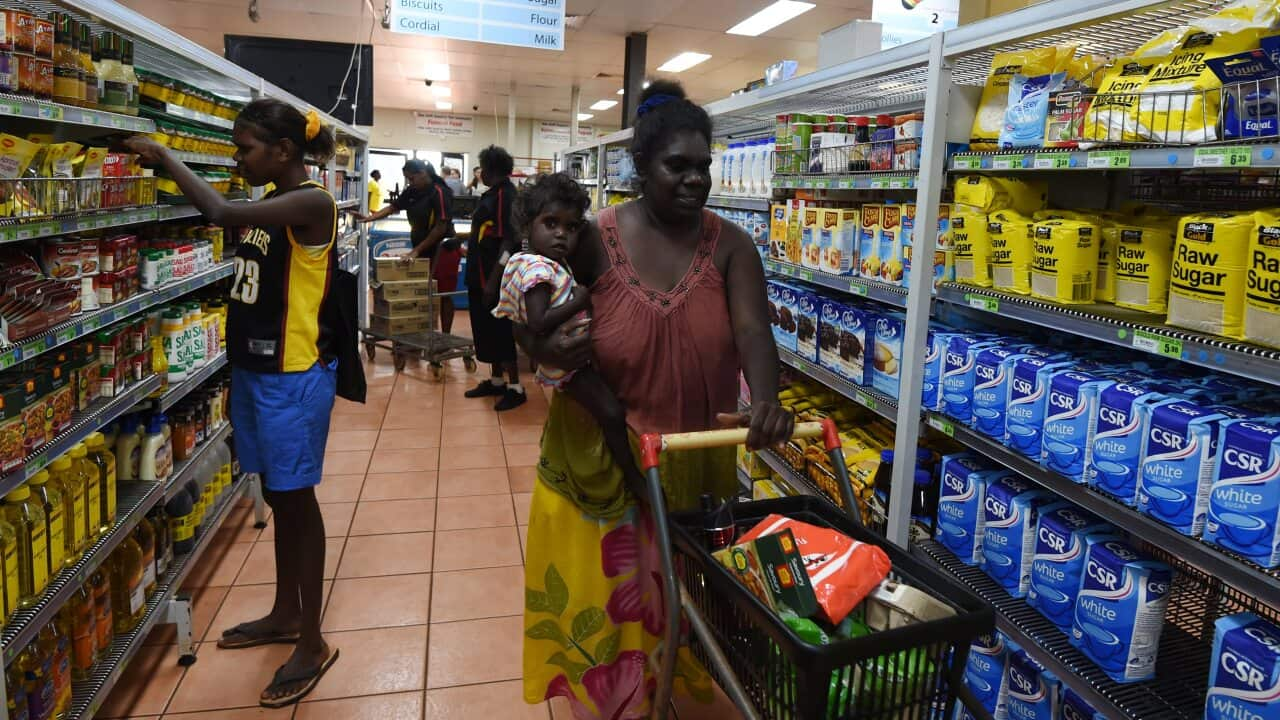An inquiry into the food security and pricing in remote Indigenous communities is recommending the Australian Competition and Consumer Commission investigate the costs of food in remote communities.
The Indigenous Affairs Committee inquiry was launched in May after concerns were raised about high food prices and food security in remote Indigenous communities.
The report tabled in federal parliament on Monday made 16 recommendations to the government.
Key recommendations include a national database of food prices, better cold food storage and transportation systems and a national regulatory body to inspect remote community stores.
The inquiry had more than 120 submissions from across Australia with concerns being raised about remote communities paying much more for basic goods than in larger towns and cities. Julian Leeser, Liberal MP and Chair of the Committee told NITV News greater transparency is needed to help bring down the costs of food.
Julian Leeser, Liberal MP and Chair of the Committee told NITV News greater transparency is needed to help bring down the costs of food.

Liberal MP Julian Leeser said there needs to be greater transparency about food prices in remote communities. (AAP) Source: AAP Image/Sam Mooy
He said a publicly accessible database would allow people to monitor prices from across Australia and allow people to compare costs from other stores.
“That means when someone would go to the checkout and get their ID scanned, those details from any remote community store would go into a database in Canberra," said Mr Leeser.
“Remote community stores are often out of sight, out of mind - we think a real time price disclosure regime would help actually provide some transparency for those stores.”
Mr Leeser said an investigation by consumer watchdog ACCC could help better regulate the costs of food in communities.
“Particularly where you've got stores where there's no competition and consumers are forced to purchase from one particular store or travel hundreds of kilometres to the nearest town.
“It's very important that the ACCC do a deep dive through an enhanced market study.
“They look at things like whether the competition law is properly servicing people, and most importantly that people can adequately make complaints to the relevant authority and they can do something about these issues,” Mr Leeser said.
The Liberal MP ruled out government subsidies to bring down prices, instead arguing that a national database and greater scrutiny from regulators would help.
“Subsidies will just get eaten up in higher prices and get eaten up along the supply chain, more generally.
'We can encourage downward pressure on food prices by ensuring supply and ensuring the participation of big national retailers,” he said.
The committee is recommending better access to freezing and cold storage and transportation to ensure food is delivered to communities unspoiled.
“Many of these communities are in a situation where they face the wet season every year and they're cut off for a long period of time.
“We need to ensure that high quality storage is put in place to ensure that food quality can remain high all through the year,” said Mr Leeser.
The bipartisan committee also recommended large retailers such as Coles and Woolworths help supply food and goods to remote communities as well as smaller retailers.
The inquiry heard consumers were forced to pay up to to three times more for basic items such as coffee, milk and bread and meat and fresh fruit was spoiled or rotten by the time they hit the shelves.

Labor MP Linda Burney said it was 'astounding' vulnerable people in Australia were paying the highest costs for basic necessities. Source: AAP
Three reports in a decade
Wiradjuri woman and shadow minister for Indigenous Australians said the inquiry echoed recommendations from previous inquiries.
“After three reports in over a decade, it’s disappointing that the same issues are being raised 11 years later," Ms Burney said.
“How are we suppose to close the gap in quality of life outcomes when we are continuing to witness – in 2020 and in such a wealthy nation – the deprivation of basic items that so many of us in non-remote areas take for granted, like electricity or sufficient refrigeration space."
Labor MP and Member for Lingiari, Warren Snowden, said prices varied across communities.
‘Why is it that a lettuce cost $12 in a community and $7 somewhere else. What’s the explanation?”
“It’s very important that we have an understanding of what prices are, why there are dramatic differences for the same items. We need to understand these things," Mr Snowden said.
The co-chair of the committee told NITV News that competition is needed to force stores to drop their prices.
Mr Snowden said a national regulator should be set up to conduct "spot checks" on stores.
“The licensing of the stores would require monitoring of the stores and their licenses including how they are operating,” he said.
He said there were real concerns about the government's coronavirus supplement for people living on benefits, coming to an end in March.
“It will be an absolute problem. The government expecting people to live in remote communities on $40 a day is ludicrous and nonsense," said Mr Snowden.
“That payment needs to increase substantially…People cannot afford to live on $40 a day, whether you live in Brunswick or Balgo - you just can’t.”
The committee recommended that better infrastructure be set up to allow communities to produce their own food locally.
The report is the third in just over a decade with many of the recommendations being made previously.
The Indigenous Affairs Committee report did not find evidence of systemic price-gouging but admitted there was a lack of national data.
The National Indigenous Australians Agency conducted a survey earlier this year examining prices in dozens of remote stores in Queensland, Northern Territory, South Australia and Western Australia.
It found costs averaged 39 per cent higher than major supermarkets in capital cities.










